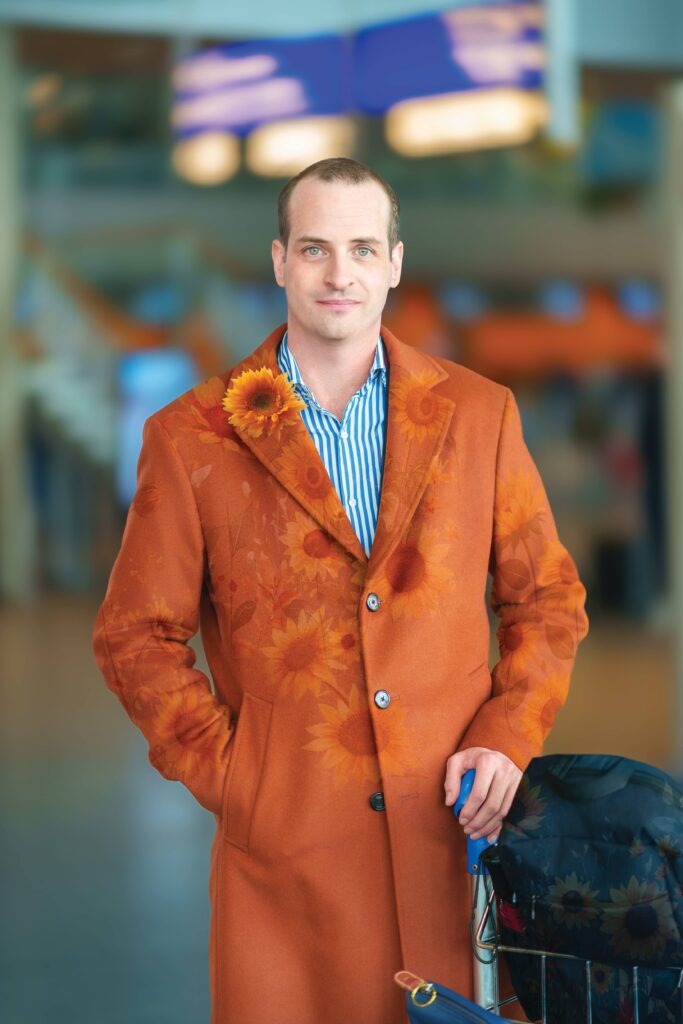
“I often find joy in small things,” Georges explains. At forty, he understands that this relationship with detail and order is connected to how his autistic brain processes the world, something he’s only understood since receiving his diagnosis in 2013.
For the first 34 years of his life, Georges lived without this diagnosis. He found joy in specific things: when dishes emerge spotlessly clean from the dishwasher, in Japanese cars and their engineering, in his work’s precise demands. His appreciation for Japanese cars centres on their “design as well as the technology and quality,” and the Japanese “immense value on perfection.”
This attention to precision serves him well at the Centre LGBTQI Plus Cigale, where he works as an administrative and management assistant. “I handle human resources, accounting, and I prepare our meetings,” he explains. The role suits someone who thrives on systematic thinking and accuracy. Documents and meeting notes from months ago remain fresh on his mind, making him both a valuable asset to Cigale and cultivating a culture of perfection of his own.
“His ability to focus intensely can produce remarkable efficiency. “My boss once gave me something and I came back after five minutes. He said, ‘Do you have any questions?’ And I said, ‘No, I’m done.’ He told me that if he had done it himself, he would have spent much longer on it.”“
Adult Diagnosis as New Compass
“My life has changed very positively since then,” Georges states about his diagnosis. The revelation brought clarity not just to him, but to those around him. “My family understands better why I react the way I do and not differently.”
The diagnosis also led to official recognition as a ‘disabled worker’ (Travailleur handicapé), obtained through a psychiatrist’s certificate. Georges is clear about what this means: “That doesn’t bring you advantages per se. It’s just that the employer is then made aware that you have specific needs that should be taken into consideration.” In other words, he gets to play to his strengths and have his talents valorised.
This awareness has been transformative at work. “Colleagues now know what my difficulties are and can accordingly take them into consideration, so I can use my [mental] resources optimally.”
Understanding the Spectrum
With this framework in place, Georges can better explain his needs to colleagues. When asked what they should understand about autism, he is direct. “I sometimes have difficulties with communication, especially when I’m stressed. Then I might seem distant or cold,” he explains. “It’s simply that I no longer have the concentration to respond optimally to my environment. That’s not ill will—it’s simply because in that moment I no longer have the capacity to do that.”
Not everyone responds with understanding, something Georges has come to accept. “There are people who don’t understand the disability and who aren’t interested in it. You have to expect that not everyone will always accommodate specific needs.”
Strengths in Structure
Yet autism also brings specific advantages to Georges’ professional life. “A great strength is my memory,” he notes. “That’s especially valuable at work—I still remember which invoice that was from five years ago.”
Georges understands both sides of his working style. In job interviews, when asked about strengths and weaknesses: “One of my strengths is that I work very much in detail. I’m very perfectionist. The disadvantage is that I sometimes spend too much time on something.” This commitment to completion drives him: “Even when it’s seven o’clock in the evening, I only stop when it’s finished.”
On Self Care
This intensity at work requires careful balance in his personal time. Outside of work, Georges structures his time differently. “I go at my own rhythm. I don’t force a program on myself that I can’t handle. I look after my resources to structure my day so that I don’t overburden myself.”
Travel strategies and challenges
This need for structure becomes particularly important when traveling. Travel means “going out of my comfort zone, to a foreign place where I don’t know exactly what’s coming at me,” Georges explains. His response is systematic preparation. “I always try to plan as well as possible. I take my sunglasses with me for bright lights, I take my noise-cancelling headphones to shield myself a bit. I try to plan the entire journey in advance.”
The challenges begin even before reaching the airport. Booking flights can be stressful: “Often it says there’s only one seat left and you only have ten minutes to book it. Then it’s difficult when you don’t know which options to check.”
Once at the airport, familiarity makes a difference. Luxembourg Airport works well for him “because I know that airport.” Larger hubs require more effort. “When I’m at an airport I don’t know, a large airport like Frankfurt or Munich, where there are many different corridors, many signs, many people, much noise—then it can be difficult to orient yourself, especially when the gate is changed at the last minute.”
Making Air Travel More Accessible
Given these challenges, Georges has specific ideas about how airports can better support autistic travellers. For staff who encounter travellers wearing the Sunflower Lanyard, he says: “I would be happy if the people working at the airport would inform themselves a bit about the topic to better understand how I function.”
He envisions a proactive but respectful approach: “When they see I arrive at the airport with the sunflower lanyard on, they might approach me and say, ‘Can we help you?’ They should be patient when they notice I’m stressed, speak calmly, and not pressure me. Then it becomes a nice experience for both sides.”
His message to fellow passengers is equally direct: “I would be happy if they would let me go through my journey in peace. If they have children with them, they should make sure they don’t make too much noise.” He pauses before adding with characteristic dry humour and self-awareness: “That was said as nicely as I could manage.”
Georges’ (Secret) Travels
Despite the challenges, Georges still dreams of travel. He had planned a trip to Washington D.C. that unfortunately had to be cancelled; his wishlist includes a tour through the USA and visits to St. Petersburg and Moscow, though the latter “may remain a dream for a long time” given current circumstances.
New travels and adventures await, including a return to his favourite ones. However, when asked about travel recommendations, Georges’ humour shines through again: “Oh yes, I have several. There are some quiet places that I always go to, but I won’t share those here because I’d like to continue having my peace there.” (There is an audible chuckle on the recording by the interviewer.)
Autism as a Lens, Not a Limit
Throughout our conversation, Georges returns to a fundamental point: “Autism is not an illness, it cannot be cured, you can only ensure that the environment is as adapted as possible, so that an autistic person can find themselves as well as possible and can best access their resources.”
This perspective shapes his advice for newly diagnosed individuals: “You’re not alone. Look for other people who also have your diagnosis, because then you’ll see aspects of yourself in those other people and you can learn how to better handle situations.”
Representation matters to him. He recommends the film “The Accountant” with Ben Affleck because “it shows the life of a person who is on the autism spectrum, how they manage their life, and gives insight into how this person manages their reality.”
Likewise, Georges often quotes the European Disability Forum: “Good practice enables, bad practice disables.” As so often in these interviews (see Benny’s), people are made to feel disabled / excluded from public and private life, rather than being unable to engage with certain spaces and experiences.
Seven years after his diagnosis, Georges has built a life that works with his autism rather than against it. His exceptional memory serves him at work, his perfectionism drives projects to completion, and his systematic approach helps him navigate travel. The diagnosis at 34 didn’t change who he is—it gave him the language to explain his needs and the framework to ensure they’re met. In a world designed for predictability and clear systems, Georges thrives.



